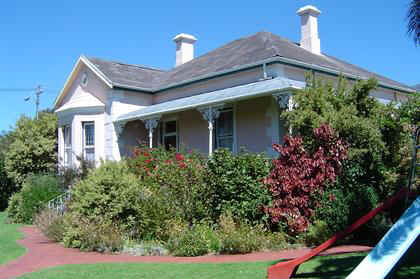
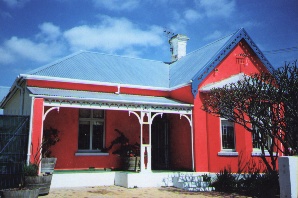
Pernille and Christian in South Afrika
March-May 2004
Cape Town April 6, 2004
Dear friends,
A lot has happened since we arrived on March 5 - so be prepared for quite a lot of text.
 |
 |
| Guesthouse - our first accommodation in Cape Town | Then we mooved to Freeland Lodge Red House |
According to our first plans, we mooved from the Guesthouse to Red House, where we
originally intended to stay. But we found it too noisy. The walls between the rooms were
so thin - we could hear practically everything that happened in the next room - and it was
really everything. Besides that, we couldn't handle the others week-old dishes and
late nights.So we took the consequenses and found ourselves a little attached house, where
we are currently staying all alone. The house came with a cleaning lady who cleans weekly
for 90 kroner, about $12! We don't even need a maid but we agreed that this would be a
good way to help this lady's income and thereby the locals.
 |
 |
| Old Audi filled with flaws | New Opel Astra- the aircondition works here |
We have got ourselves a new rental car because the old car that came with
the old tenancy didn't quite work out. Should you trust a car where all the alarm lights
glow and tells you that the brakes aren't functioning properly? The Speedometer and
aircondition didn't work either. When we remarked that we had been promised a car with
aircon we got the reply 'There is'. Which there is, we just didn't know you had to specify
that the aircon had to work. It shouldn't have to be specified that a rental car should be
able to drive? Christian found a little Opel Corsa, Vectra or Astra - I don't quite
remember. It's an Astra - Christian says during a readthrough.
 |
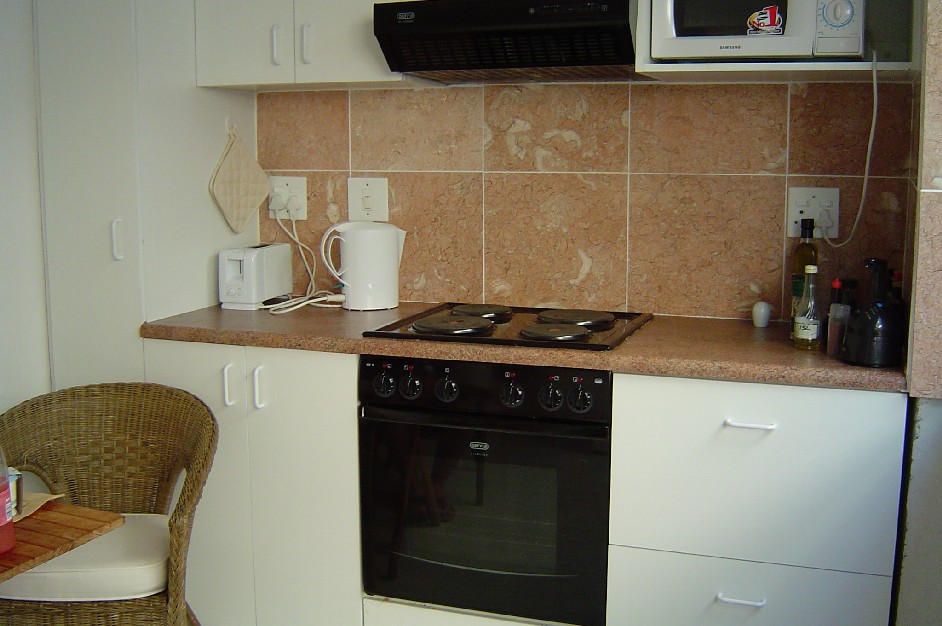 |
| Third - and most likely last - home in SA | -with a modern kithcen |
It's a strange world where we can allow ourselves to be unsatisfied with
relatively small things. Rent a house, find another car. While others can be so
unsatisfied with the bigger picture, lack of food and a roof over their heads, without
being able to do anything about it. That is actually the worst thing about this place. I
imagine that it's worse than a place where everyone is poor. Here the differences are so
enourmous and visible. From back to the Apartheid the Caucasian have had the places full
of natural beauty. Cape Town is said to be one of the most beautiful cities in the world.
Everything grows here, exotic flowers compete to stand by the road side. There's a view of
the mountains and the sea. But thats only a part of the picture. No flowers grow on the
dusty roads in Khayelitsha.
What especially gives a bad taste in your mouth, is that you can close your eyes to it
when you please. Many locals don't even realise how many others are forced to live. You
can live your whole life here , not seeing a thing, staying only in beatiful places or
airconditioned malls. I obviously wish I could be better, do more, but I don't know how.
Gradually I've become on the nip of bursting into tears all the time. It's especially in
the car om my way till and from work, where I pass the golfcourse as well as cardboard
city that it happens, or when I'm approached by a beggar. I still find it hard with
beggars. I know that a lot of families get by for 20 kroner ($3) a day. Therefore I
believe that my small change might feed them that day. I know that it's no longterm help
but on the other side I dont miss the 3, 5 or 7 kroner (50, 70 cents or $1) I
sometimes give them. I sometimes wonder that there across the world excists an unwritten
rule that you have to react negatively towards beggars. Either you ignore them or respond
to them in an angry manner. It's your own problem if you want to give them money, but you
don't have to react as though they have offended you, do you? Or maybe that is the problem
- they get you on your bad conscience or the conscienceness of not having a bad
conscience? One day a young woman with a baby approached us in front of our house. I
gave her what equals to 3 kroner or 50 cents, and appologised for the small amount, gave
her a smile and wished her a good day (as I usually do). She thanked me and hurried on.
After a few steps she turned around smiling, thanked me again and blessed me.
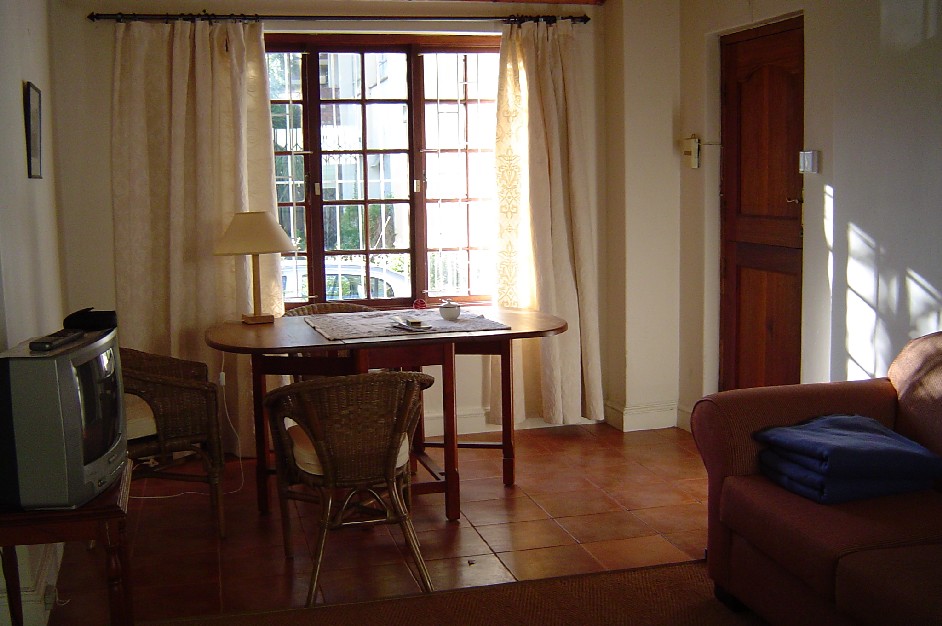 |
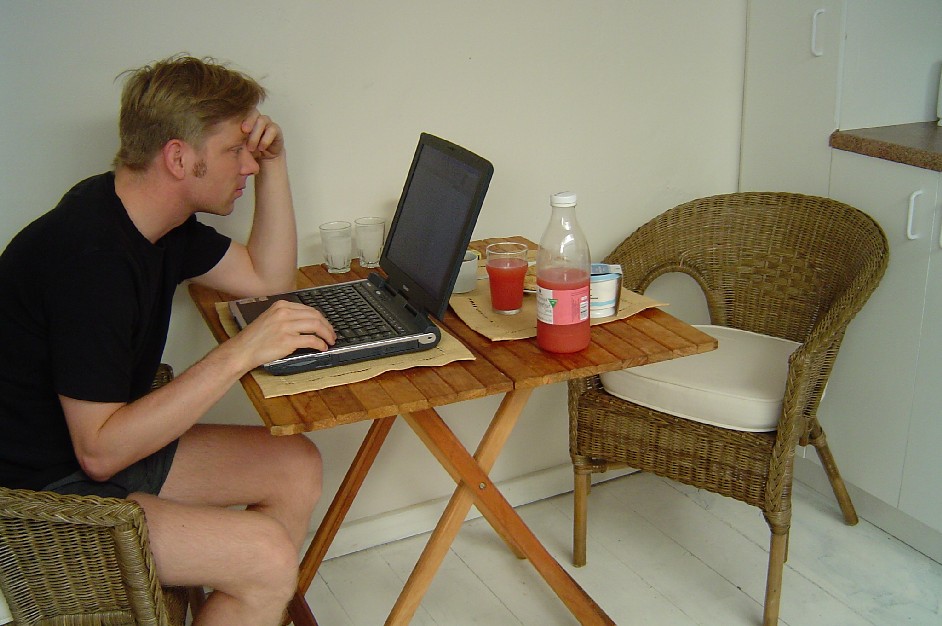 |
| - a nice living room | - writing the days repport |
These past weeks I've had enough to do at work. Ruth, my colleague and advisor, returned
from a conference in Botswana and got me working. I work with Ruth and Abigail on the
earlier described poverty project. Gavin, who was so nice to accept me as an internal, is
my colleague on the project with the invironmental workers. In the beginning I found it
hard to understand what Gavin said. I have realised that English isn't just English.
People talk with the most amazing accents. Gavin is a funny one. Coloured, as the South
African expression is for people of origin from India, square built, slightly overweight
with a, maybe, pretty face hid behind a pair of big glasses and a curly beard. When he
speaks he sits quite far out on his chair and rocks forwards and back in coordination to
his speaking, every other sentence in accompanied by his hand, placed over his mouth,
where it assists by an uneasy breath. I think he suffers from astma, or maybe some sort of
anxiety, I don't know for sure.While one hand is occupied by the mouth the other writes
and draws weird calculations and duddels. His introduction of the project with the
invironmental workers was not easy understood and at the end he gave me some handwritten
notes and some worksheets with a bunch of numbers and said I could take a look at
them and decide whether I wanted to join the project or not. To be honest I didn't
understand a thing but answered with a polite, "yes please", because I was
desperate to get something to do. So in the beginning I wasn't to convinced about the
project. But now I'm very happy I accepted. And now as I have learned to understand Gavin,
can read his notes and understand his complicated chains of thought, I've become convinced
of the relevance - and that there's a brilliant mind behind the curls and the strained
breathing. The project has also shown to be more practical than I thought and it has also
got political implications. The other day I was at a meeting with the healt director of
Cape Town. An interesting white (homosexual) man, who, it is said about, was in prison
during the Apartheid, partly for being open about his sexuality, partly for denying to
join the military and for being politically active. To judge after his appearance at the
meeting I can easily imagine how he could stir up things.
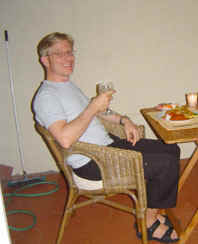 |
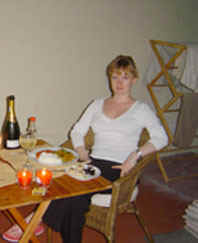 |
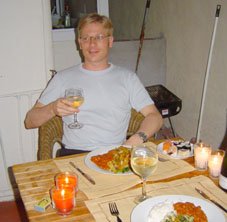 |
| - Enjoying the evening | - it really is outdoors | - time for a toast |
As i briefly mentioned in my last letter, I have joined some 'environmental health
officers' (EHO's) at work. I was surprised to see how many jobs they have to do. They do
food sanitary controls, inspect institutions, schools and undertakers, they take care of
air-, chemical-, smoke- and noisepollution, contagion finding, workplace inspection,
building inspection, pest detection and inspect animal keep, water, sanitary and lots of
other things.
 |
 |
| - protected by appropriate fencing | This office is Pernilles at the institute |
We will continue the translation within a few days (written April 9th,
2004). Picture texts below are translated already.
On the first day I visited a welldeveloped area, along with an area with both well and
underdevelopedparts.One of the goals with the project I'm doing is that I have to convince
the EHO's to do more developmental work in their area instead of the current
inspections they do. In a lot of areas there is a lacking in knowledge of hygene and
security for example. Earlier one kept very close to the law when giving inspections -it
had to be obeyed! No explenation was given as to why and how the individual shopkeeper
could do. Now EHO's have started to do inspections where they inlighten and guide, before
letting the hammer drop and threaten to close up peoples shops, fo examle. We would like
for them to value that part of their work along with doing preventive developmental workin
thier areas. The EHO's take great interest in documenting and reporting what and how much
they have done. When I questioned what they had against doing developmental work, one of
their main argument where that that kind of work can't be mesured. When asked they said
that it's not just a requirement from their superior that they mesure their performance
but also for their own sake. They themselves would like to know exactly what they have
achieved. Another one of their argument was that they didn't want to take time from their
food healt inspections in the developed parts of the city. The food health standard which
has been reached shouldn't get lost in the attempt to do developmental work.
In Khayelitsha, as I have mentioned earlier the EHO's hardly do anything but developmental
work. It's apparantly the other EHO's impression that not much is done in Khayelitsha.
"They just have meetings all the time. I don't think one sences any action." and
"How can they actually messure what they do, I don't understand that.", where
some of the statements. Especially one of the EHO's ( the one from the well developed
area) had some comment which where very rabid. She was very amused by the fact that they (
the EHO's from Khayelitsha) at a joint meeting had shown statistics on overheads. One
overhead showed how Khayelitsha was the area where the largest amount of condoms had been
distributed to the inhabitants, the next overhead showed that Khayelitsha also was the
place with the most new cases of HIV-infection percentage wise. While she was
telling the story she was laughing a lot (in a mocking manner), in her world it was solid
proof that they apparently do not do their work properly in Khayelitsha. I was a guest and
therefor I politely suggested to her that there could be many other explenations to the
connection between the two overheads. The aswer might be that the number of contaminated
had been even higher if the condoms hadn't been distributed, it might even be that the
condoms had been distributed as a consequence to the large infection frequency. I couldn't
ressist the temptation of investigating the case and asked some colleagues at the office,
what I had last suggested to the EHO actually was the case.
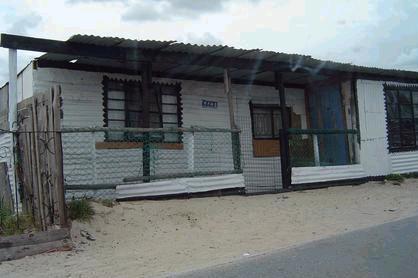 |
 |
| Khayelitsha - appointed the most dangerous area of ZA | - and not far away, you can enjoy life |
When I drove around the cardboard city Delft with the invironmentalworker Roberto, he
asked me if I knew what a 'smiley' is. Immediatly I thought of the food and health
inspections 'smiley-arrangement'. The smiley Roberto showed me was of an entirely
different kind. Around the corner in what was supposed to resemble a food stand, two dozen
chopped of sheeps heads where presented on a table. Cooked they kost about 10 kroner! in
other stands they sell guts from god knows what creatures, they just lie there on the
table in the sun, lungs, intestines, undefined tissue. It's awfull to think about how
people can be forced to eat stuff like that. Roberto also showed me a kindergarten in
Delft. In the space where the law permits 10 children, there where 60 (take a look at the
pictures on my dads homepage)!
In Khayelitsha I drove around with Solomzi (called Soli). He started out by explaining to
me that he couldn't vouch for my safety. Things could happen that he couldn't control. I
understood and agreed. When we after the trip around Khayelitsha talked at the office, I
asked him if personal safety was a big worry for him and his colleagues. He affirmed it
but didn't go into details. when I shook his hand goodbye I noticed that he wasn't capable
of returning it, because of a handinjury. Ruth told me that Soli and his wife had been
mugged and shot on new years eve a few years back and that the nerve dammage came from
that. I'm wondering if I put him an akward position by asking so much about the safety
issue. Luckally I have met him several times since, last at a meeting with the
healtpresident and every time I have been met with a great big hug (no more handshakes).
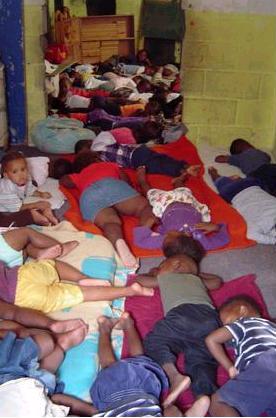 |
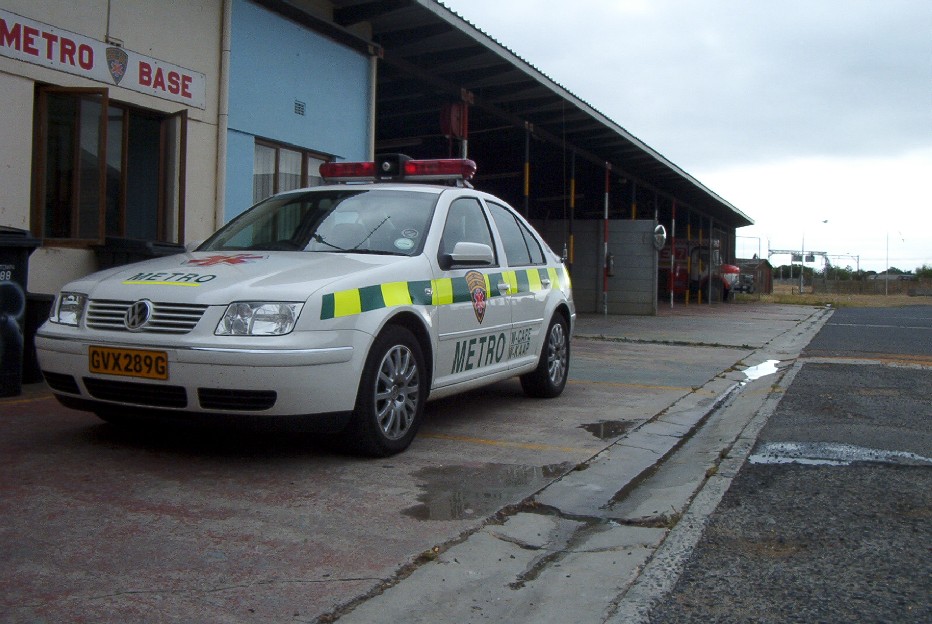 |
| 60 children in kindergarden approved for 10 | - and here the doctors service car |
Christian experiences a lot, even though he's not quite satisfied. He comlains about how
not enough happens on his shifts. Before he gets to work and after he has left evrything
gets going, but as soon as he's back on duty it's quiet. Yesterday he missed a
sharkattack, which he's very unhappy about. Well it's one of the most important thigs to
have an experience with as a doctor in Denmark! At the moment he's working in the trauma
admission ward. He's been close to packing up and leaving several times. No one has ahd
the time or the desire to explain the situation to him, the nurses talk and drink coffee
whilst the patients are suffering and Christian is searching for the things he need.
There's no administration and all the doctors apparently work autonomously and to their
own beliefs. Luckally he's only got one shift left before he goes back to tha ambulance
service for a while.
Everything Christian 'has not' experienced includes several car accidents, knife wound
victims, gunshot victims and a lorry, falling down onto the highway crushing a car with a
passenger, whom it was succeded to revive.
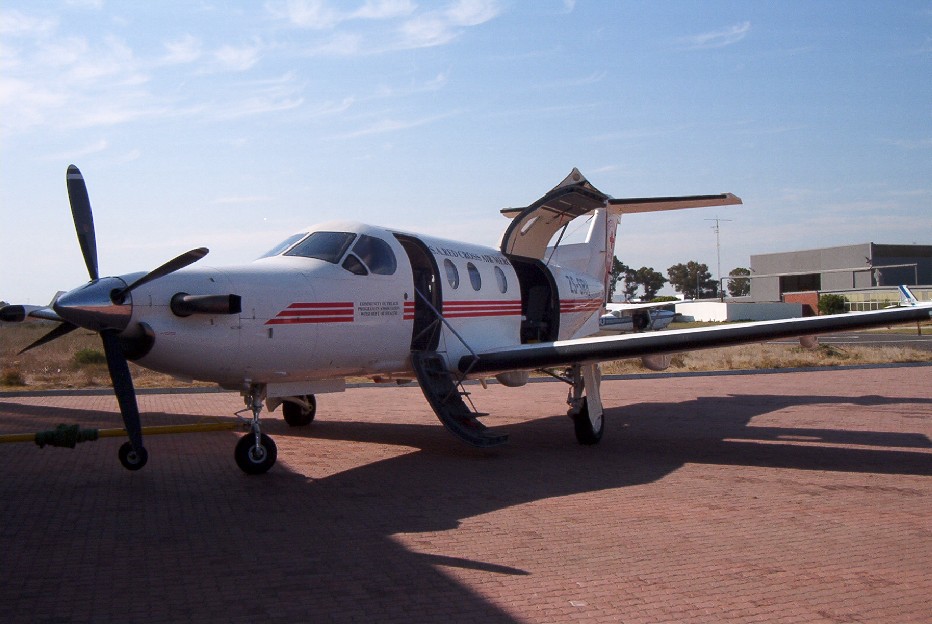 |
 |
| - sometimes he has to turn out by plane | From incident at Nelson Mandela's home on March 16 |
Tue Mar 16, 2004 04:09 PM ET
CAPE TOWN (Reuters) - Security officials shot dead a man outside anti-apartheid icon Nelson Mandela's Cape Town home, police said on Tuesday.
National police spokesman Selby Bokaba said three men approached security officials shortly after 5 p.m. asking if the home was the residence of Anglican Archbishop Desmond Tutu, and demanded to speak to either Tutu or Mandela claiming they had information about plans to disrupt the upcoming elections. One of the men later returned brandishing a rifle.
"He tried to cock the rifle and aimed it at the officials standing at the gate, opening fire at them. The officials returned fire and the man was shot dead," Bokaba said. Police arrested the dead man's two companions, he said.
The 85-year-old former South African president was at his Johannesburg home at the time and the motive for the attack was not known. South Africans go to the polls for national elections on April 14.
 |
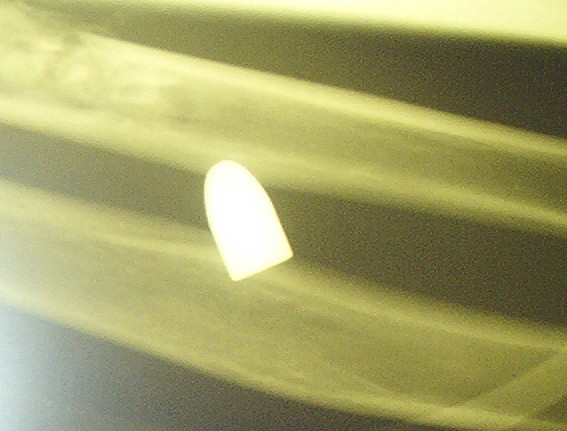 |
| Bullet wounds are daily routine at Groote Schuur | The X-ray shows that there is still a bullet in the arm |
One night I dared to go along with Christian and the ambulance. As you know I don't
enjoy driving particularily fast and after the first 'blue lights and sirens on' trip I
didn't think i had anymore adrenalin left in body for the rest of the night. It went on
quite peaceful though. The first trip was a 'false alarm', which means that you can't find
the injured. It might be because the person was privately insured and has beed picked up
by a private hospital or that the victim and standbyers got to tired of waitinhg and
transported the victim to the hospital themselves. The time for the ambulances to get to
the scene is amazingly long, 45 minutes isn't uncommon. Partly it's because of a lack in
recources. There are way to few ambulances to cover a way to big area, but as Christian
has explained to me and as I myself experienced they spend a long time talking to each
other before they once again announce themselves ready over the radio. Every time our
paramedic announced herself ready she immediately had a new trip, which implies that they
are waiting for her to get ready.
The next victim was to a knife wound victim. A young girl had been stabbed in the
shoulder, alledgedly on her way home from shopping. Her boyfriend had fresh scratches on
his throat and I suspected him, but that's not something you meddle in. An hour and a half
had passed from the stabbing before we arrived - it would have been frontpage story in
Denmark. She was in great pain. When Christian had finished treating her, the paramedics
took over and while they where writing down her information, they were talking and
laughing over the head of the crying girl. No one apparently cared to mend her soul.
Allegedly they see so many stab victims that they can't get excited about it anymore. But
to me that is no excuse to forget that it's people they are dealing with. I immediately
lectured Christian about never becoming so careless of his patients.
The nights last trip was an 82-year old woman who had collapsed. She lived in one of the
less nice areas of the city. When we arrived it seemed like they had called in the whole
nighborhood. Anyway there was a whole crowd of people, which isn't unusual. The apartement
as well was filled with people, who was in the living room watching Star Wars. The woman
was in the next room and actually looked kind of dead. We got people to leave and by
closer exam she was still clinging on to life. The apartement was about 35 m2 and I
counted at least 25 people besides us. I think most of them where relatives. The woman had
collapsed on her way to the toilet and the family wanted to clean her up before we left
for the hospital. While we were there I overheard some people whispering 'Doctor, doctor'.
There's a huge need for doctors here and I think they where very honored to have a doctor
with the ambulance. I didn't really have a function, so I carried different supplies back
to the ambulance. All the way through the living room people were thanking me. The
hospital was something af a scare. The acceptance ward was one big room, with patients
lying against the walls.
 |
 |
| Many horrible stories can be told from emergency ward | Here a man punished his woman - using knife |
No portable walls or drapes, no privacy. By the wall a lot of people were also sitting
with oxygen masks -they didn't have enough beds for the people needing oxygen because of
astma or tuberculoses. We dropped off the older lady but had to leave her wihtout any sort
of monitoring equipment. One of her many daughters got permission to stay by her side, the
rest of her family had to wait outside.
While we were waiting for our paramedic to finish talking to her colleagues the old lady's
son in law came over and thanked me for my effort. I tried to explain to him that i hadn't
done anything -and I wasn't able to, but I was just there to observe and that I was from
Denmark and felt and was quite helpless. He said that what mattered was that I was here.
That I was bothered to come from my rich world, where ever that is, to get into the
situation of how someone like him lives. I got so touched by this, especially because I
feel so helpless. Maybe it's the best I can do -to see, pass on and document the way of
living here. While his mother in law took her last breath, he eased my disillutioned
idealist soul. It should have been the other way around.
 |
 |
| A truck fell down on the highway | - where it hit and smashed a car |
There is a lot more I would like to write about, but it's late and you are probably tired
of reading, so I'll stop here.
I hope that you are all well - here in Cape Town the fall is slowly coming in.
Best regards,
Pernille
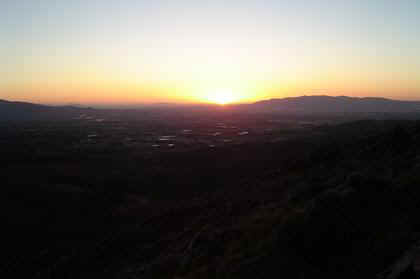
- but the sunset is so beautiful